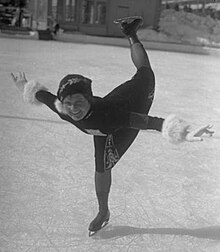
The 1932 Winter Olympics, officially known as the III Olympic Winter Games, [1] were a winter multi-sport event held in Lake Placid, New York, United States, from February 4 to February 15, 1932. A total of 252 athletes representing 17 National Olympic Committees (NOCs) participated in these Games. Overall, 14 events in 7 disciplines were contested. [2]
Contents
- Bobsleigh
- Cross-country skiing
- Figure skating
- Ice hockey
- Nordic combined
- Ski jumping
- Speed skating
- Statistics
- Multiple medalists
- See also
- References
- External links
The Olympic program remained similar to previous Winter Olympics, with only a few exceptions. [2] [3] [4] Both men and women competed in these Games. [5] Warm weather forced officials to hold the four-man bobsleigh competition two days after the closing ceremonies, which had been conducted on February 13. [6]
A total of 87 athletes won medals. [7] Athletes from the United States earned the most medals during the Games, winning 12 medals, half of which were gold. Athletes from Norway and Canada won the second and third most medals, with 10 and 7 respectively. [8] Athletes from 10 participating NOCs won at least one medal; 7 won at least one gold medal. [8]
Sonja Henie of Norway won her second consecutive gold medal in the ladies' individual figure skating competition. [9] Andrée Brunet and Pierre Brunet of France won their third consecutive medal in pairs figure skating, having won bronze in Chamonix before golds in St. Moritz and Lake Placid. [10] [11] In the men's event, Austrian figure skater Karl Schäfer beat out three-time Olympic champion Gillis Grafström of Sweden. [12] American Edward Eagan became the first athlete to win medals at both Summer and Winter Olympics; he had won a gold medal in light heavyweight boxing at the 1920 Summer Olympics and took home a gold in the four-man bobsleigh at Lake Placid. Although other athletes since have earned medals in both Summer and Winter Olympics, Eagan remains the only person to have won gold medals in both. [2] [13]



